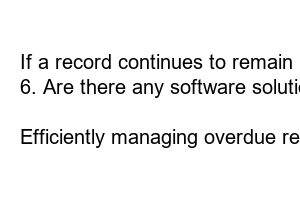연체기록 조회
Title: Overdue Record Inquiry: The Key to Efficient Operations and Enhanced Productivity
Introduction:
In today’s fast-paced business environment, maintaining a streamlined operation is crucial for success. One aspect that often gets overlooked is managing overdue records, which can significantly impact productivity and create unnecessary bottlenecks in your workflow. In this blog post, we will delve into the importance of overdue record inquiry and how it can revolutionize your business operations.
1. Understanding Overdue Records:
Overdue records refer to pending tasks, uncompleted projects, or unresolved issues that exceed their designated deadlines. These records can accumulate over time, leading to a pile-up of pending work, affecting efficiency, and impeding progress.
2. The Impact of Overdue Records on Business:
Having a substantial number of overdue records can substantially impact your business. It can result in missed opportunities, dissatisfied customers, delayed projects, and increased costs. Moreover, it hampers employee morale and may lead to a negative reputation in the market.
3. Benefits of Proactive Overdue Record Inquiry:
By engaging in proactive overdue record inquiry, you can identify the root causes of delays, address them promptly, and prevent future occurrences. It enables you to assess your workflow efficiency, provide excellent customer service, and improve overall productivity.
4. Strategies to Effectively Manage Overdue Records:
i. Prioritize and Organize: Sort overdue records based on urgency and priority to ensure essential tasks receive immediate attention.
ii. Communication and Collaboration: Streamline internal communication channels to keep all stakeholders informed about pending tasks, progress, and deadlines.
iii. Automation and Tracking Tools: Utilize technology to automate reminders, track deadlines, and monitor progress efficiently.
5. Overdue Record Inquiry Best Practices:
i. Regularly Review Records: Schedule routine reviews to identify and address overdue records promptly.
ii. Set Realistic Deadlines: Ensure deadlines are reasonable and allow enough time for completion.
iii. Monitor Performance Metrics: Establish key performance indicators (KPIs) to monitor progress and assess the effectiveness of your strategies.
6. Implementing Overdue Record Inquiry:
To effectively manage overdue records, it is essential to implement a systematic approach within your organization. This may involve allocating resources, training employees, and utilizing relevant software tools to track and resolve overdue records efficiently.
FAQs:
1. What are the primary causes of overdue records?
Overdue records can originate from various factors such as lack of clear communication, inefficient processes, resource constraints, or external dependencies.
2. How can overdue record inquiry improve customer satisfaction?
By addressing overdue records promptly, you can ensure timely delivery of products or services, enhancing customer satisfaction and loyalty.
3. Can overdue record inquiry be applied to any industry?
Absolutely! Overdue record inquiry is a universal approach that can be implemented across various sectors, including manufacturing, healthcare, finance, and more.
4. How often should overdue record inquiry be conducted?
The frequency of overdue record inquiry depends on the nature of your business operations. However, regular reviews, at least on a monthly basis, help ensure timely resolution.
5. What if a record continues to remain overdue despite inquiry efforts?
If a record continues to remain unresolved, it might be necessary to investigate underlying issues, such as resource constraints or process inefficiencies, and take appropriate corrective actions.
6. Are there any software solutions available to help manage overdue records?
Yes, there are numerous project management and task tracking software available in the market that can streamline the process of managing overdue records and facilitate effective collaboration between teams.
Summary:
Efficiently managing overdue records is crucial for the smooth functioning of any organization. By proactively conducting overdue record inquiry, businesses can identify and address bottlenecks, improve productivity, enhance customer satisfaction, and deliver timely results. Implementing best practices and utilizing the right tools will ensure a streamlined workflow and keep your business at the forefront of success.

